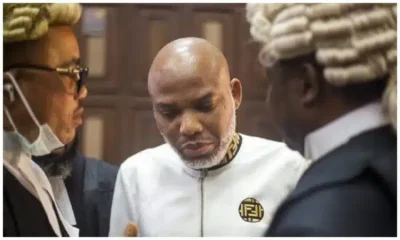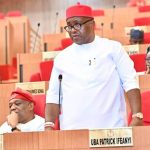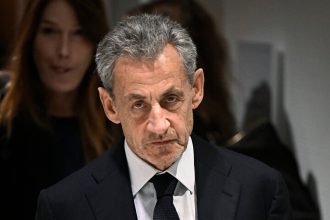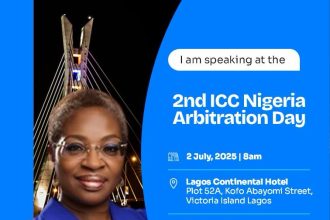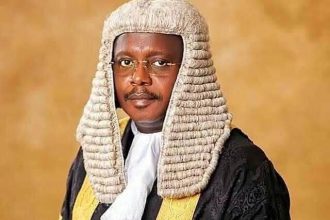Background of Nnamdi Kanu’s Legal Battles
Nnamdi Kanu, the leader of the Indigenous People of Biafra (IPOB), has faced multiple charges since his arrest by Nigerian authorities in 2015, including treason, terrorism, and managing an unlawful organization.
His initial detention sparked protests, especially in Nigeria’s southeast, where Biafran separatist sentiment is strong. After being granted bail under strict conditions in 2017, Kanu fled the country, claiming threats to his life following a raid on his home by security forces. His flight led to the revocation of his bail.
In June 2021, Kanu was controversially re-arrested in Kenya and brought back to Nigeria to face renewed terrorism charges. His legal team has contested the legality of his extradition, citing violations of international law. Since then, Kanu has been in the custody of the Department of State Services (DSS) while his legal team has fought unsuccessfully for his release on bail.


Kanu’s Request for Recusal and Justice Nyako’s Response
During a recent hearing, Kanu raised concerns about the fairness of the judicial proceedings, claiming that Justice Binta Nyako had failed to follow Supreme Court directives related to his case. He argued that the Federal High Court lacked the proper jurisdiction over the matter and expressed a loss of confidence in Justice Nyako’s ability to deliver impartial justice.
In a bold move, Kanu directly addressed Justice Nyako, asking her to recuse herself from the case. Despite attempts by his counsel, Alloy Ejimakor, to de-escalate the situation, Kanu remained firm in his request.
Justice Nyako agreed to step down from the trial, stating she would forward the case file to the Chief Judge for reassignment. This recusal raises the possibility of further delays in the trial, as the judiciary now waits for a new judge to be appointed to oversee the proceedings.
Kanu’s Legal Team and Bail Issues
Kanu’s legal team has repeatedly sought bail for him, citing his deteriorating health and the prolonged nature of the trial. However, Justice Nyako has denied these requests, pointing to Kanu’s previous flight from bail conditions. Despite his not-guilty plea to the terrorism charges, Kanu remains in DSS custody, awaiting the reassignment of his case to another judge.

This recent move by Kanu signals a turning point in his trial, with the possibility of new judicial leadership affecting the direction of the case. Whether this will work in Kanu’s favour remains to be seen, but it reflects the deep mistrust he harbours towards the judicial system handling his trial.
Conclusion
As Nnamdi Kanu’s case continues to unfold, the focus now shifts to the Chief Judge reassigning the case. With Justice Nyako’s recusal, it remains to be seen how quickly the trial will progress and what new legal strategies may emerge. Kanu’s ongoing detention by the DSS and his legal team’s persistence in fighting the charges against him will likely keep this case in the public spotlight for the foreseeable future.
For more in-depth analysis and updates on Kanu’s trial, visit LegalLinkX.com.



